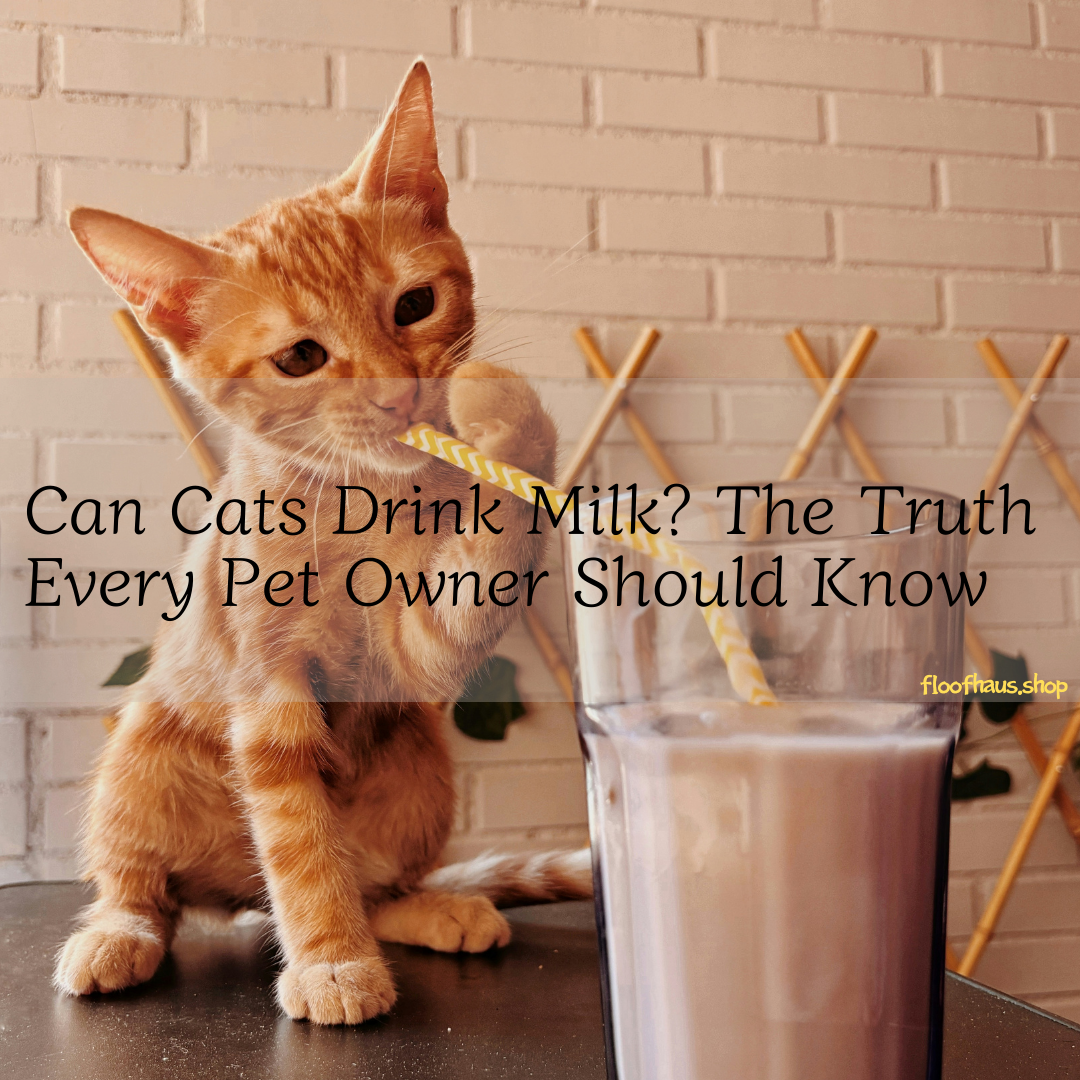
Can Cats Drink Milk? The Truth Every Pet Owner Should Know
Share

Introduction: Why the “Cats and Milk” Myth Persists
It’s an image we all know: a happy cat curled up by the fireplace, licking milk from a saucer. Movies, cartoons, and even children’s books have long promoted the idea that cats love milk. While it’s true many cats will drink milk if you put it in front of them, that doesn’t necessarily mean it’s good for them.
So, can cats drink milk safely—or is it time to retire this old stereotype? Let’s break down what’s really happening when your cat drinks milk and whether it belongs in their diet.
Can Cats Drink Dairy Milk?
The short answer: most cats should not drink it.
While kittens are able to digest their mother’s milk thanks to an enzyme called lactase, adult cats typically lose much of this ability as they age. Without enough lactase, they struggle to digest lactose, the sugar found in cow’s milk.
This leads to lactose intolerance, which can cause unpleasant digestive issues. So, even though cats might be drawn to milk, their bodies often can’t process it properly.
👉 In other words, cats can drink milk, but for most, it isn’t healthy.
Why Cats Are Drawn to Milk
If milk isn’t good for cats, why do so many seem to love it? The answer lies in the fat and protein content. Whole milk is rich, creamy, and calorie-dense—qualities that naturally appeal to carnivorous animals like cats.
However, what tastes good doesn’t always align with what’s safe. Cats lack the digestive tools to handle milk the way humans or even dogs sometimes can.
The Dangers of Giving Cats Milk
Let’s look at what can happen if your cat regularly drinks milk.
1. Digestive upset
The most common symptom is diarrhea. Lactose passes undigested into the intestines, drawing in water and causing loose stools.
2. Gas and bloating
Cats may become uncomfortable, gassy, and bloated.
3. Dehydration risk
Ironically, because diarrhea causes fluid loss, milk can leave your cat more dehydrated rather than helping them stay hydrated.
4. Weight gain
Milk is high in fat and calories. For indoor cats who already struggle with weight management, regular milk can contribute to obesity.
Are Any Types of Milk Safe for Cats?
Not all milk is created equal. Let’s explore different types:
- Cow’s milk: Generally not recommended.
- Goat’s milk: Easier to digest but still contains lactose.
- Plant-based milk (soy, almond, oat, coconut): Not suitable for cats—many contain additives and sweeteners that can be harmful.
- Lactose-free milk: A better option, but only in moderation.
There are also special cat milk products sold in pet stores, which are lactose-free and safe as an occasional treat.
Can Kittens Drink Milk?
Yes—but only their mother’s milk or specially formulated kitten milk replacer (KMR).
Kittens rely on milk for nutrition in their early weeks of life. However, once they’re weaned, they should not drink cow’s milk or other dairy products. Feeding cow’s milk to kittens can cause malnutrition and digestive issues.
Alternatives to Milk for Cats
If your cat loves the taste of milk but you want to avoid health risks, here are safe alternatives:
- Fresh water: Always the best option for hydration.
- Cat milk (lactose-free): Available in pet stores, designed specifically for feline digestion.
- Bone broth: Unsalted chicken or beef broth can be a hydrating and tasty treat.
- Wet cat food: Naturally higher in moisture content, helping with hydration.
What About Cheese, Yogurt, and Dairy Treats?
Some cats seem to tolerate cheese or plain yogurt better than milk because these dairy products have lower lactose levels. Still, these should only be given in very small amounts and not as a regular diet item.
Cheese can also be high in sodium and fat, which aren’t ideal for feline health.
Signs Your Cat Shouldn’t Drink Milk
Watch for these symptoms:
- Loose stools or diarrhea
- Gas or bloating
- Vomiting
- Decreased appetite
- Lethargy
If you notice any of these, avoid giving milk again and consult your veterinarian if symptoms persist.
So, Can Cats Drink Milk at All?
The bottom line: cats can drink milk, but they really shouldn’t.
For most adult cats, milk causes more harm than good. The occasional small serving of lactose-free cat milk is fine as a treat, but plain water should always be their main source of hydration.
Remember: what’s cute in cartoons doesn’t always work in real life.
How Floofhaus Supports Cat Gut Care
At Floofhaus, we know how important safe, sensible treats and hydration are for cats. That’s why we stock and recommend vet-friendly options and practical products that make it easy to spoil your cat responsibly:
- Lactose-free cat milk — specially formulated, easy-to-digest milk alternatives designed for feline tummies.
- High-moisture wet foods & unsalted bone broths — great ways to boost hydration without added sugars or harmful ingredients.
- Filtered water fountains & stainless/ceramic bowls — encourage sipping with fresh, flowing water and safe materials.
- Cat-safe dairy alternatives — plain, unsweetened yogurt-style treats and single-ingredient toppers (xylitol-free).
- Guides & vet-backed advice — clear, practical resources to help you decide if and how your cat should drink milk or enjoy treats.
- Personalized product recommendations — reach out to our support team for tailored advice based on your cat’s age, health, and preferences.
Conclusion
Cats are curious creatures, and they’ll often try sip on milk if it’s available. However, the truth is that milk isn’t a healthy choice for most felines. Understanding their lactose intolerance, potential digestive issues, and healthier alternatives helps you keep your pet safe and happy.
If you want to spoil your cat, choose specially formulated cat milk or stick with safe hydrating options like bone broth. Your cat won’t miss out—and you’ll avoid unnecessary trips to the vet.
Sources
ASPCA – People Foods to Avoid Feeding Your Pets
VCA Animal Hospitals – Food Allergies in Cats
Cornell University College of Veterinary Medicine – Feline Nutrition
